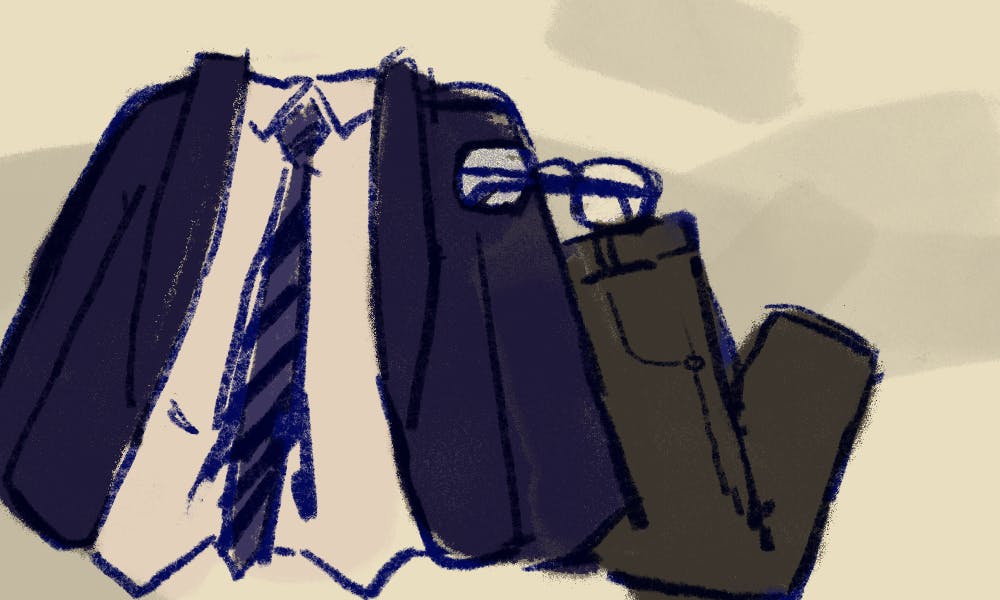Typewriters; wax seal stamps; vintage outfits with an emphasis on beige and brown hues. You’ve seen it all before, and probably imagined it too—attending boarding school in New England, penning (or receiving) love letters, spending your days surrounded by books and Gothic architecture. Originating on Tumblr in 2012, the subculture of dark academia has long fascinated a particular kind of young person.
But it’s not enough to dress the part—you have to act it too. Adopting this lifestyle involves the pursuit of knowledge, but in a way that can’t be divorced from elitism. In fact, one could argue that Donna Tartt’s The Secret History is the epitome of dark academia: a group of students, who are handpicked by an enigmatic professor to study classics at a liberal arts college, murder a fellow student, instigating a cycle of corruption and moral decay.
In recent years, this aesthetic has garnered an audience on TikTok, in particular as a source of fashion inspiration. Its appeal was magnified as schools across the world adopted remote learning, with Google searches for “dark academia” increasing by 4750% in spring 2021. Fans of the trend rejected a life experienced entirely within the digital realm and used this form of self–expression to regain a sense of control over their lives. However, many of these recent adoptees lack familiarity with the basis of the dark academia aesthetic, best represented in cult classic films like Dead Poets Society, Kill Your Darlings, and Rope.
In Dead Poets Society, Welton Academy, an all–boys school that sends more than 75 percent of its students to Ivy League schools, welcomes Mr. Keating (Robin Williams) to their English department. An unorthodox and captivating teacher, Mr. Keating encourages the boys to challenge renowned poets and writers with their own perspectives, to spread poetry because “the human race is filled with passion,” and to lead extraordinary lives. Through readings of Lord Byron and Thoreau, he helps our protagonists, Todd and Neil, realize their potential as artists, although the latter meets a tragic end when he realizes that the life he wants to live is incompatible with his father’s practical ambitions for him.
A stark contrast, Rope plumbs even deeper into the sinister side of dark academia. Using the Nietzschean conception of the Übermensch—a superman who rejects the teachings of God and authors his own life, beliefs, and values—Brandon and Philip play God and strangle their friend, the beloved and almost–too–perfect David, to death. They proceed to bury him in a chest, upon which they host a buffet, taunting their ignorant dinner guests with their superior knowledge. Alfred Hitchcock abandons all subtlety when he has Philip shy away from the light in fear of being discovered. And why do they kill David? “Well, murder can be an art, too,” Brandon remarks, with the delusional intensity of a madman.
These themes of death, rebirth, love and passion provoke the audience over and over again. The radical group featured in Kill Your Darlings seeks to inspire a literary revolution while high on drugs (and literature), embodying the artistic decadence and rebellion associated with the Beat poets. They liberate themselves from fixed form poetry, destroy classic literary works, and subvert authority. The film is as much a caricature of teenage recklessness as it is a journey of self–discovery. The most haunting part is that it’s semi–biographical in its retelling of a murder case documented by the New York Times: “Columbia Student Kills Friend and Sinks Body in Hudson River.”
The duality of dark academia is what makes audiences simultaneously attracted to and repulsed by it. Its philosophy is in many ways refreshing: it promotes love of the written word and centers humanity on a stage that’s been dominated by materialistic desires for far too long. Its message remains relevant today, as humanities programs at schools and universities across the country are at risk of facing funding cuts or being eliminated entirely. The devaluation of the humanities and arts, disciplines essential to fostering creativity, is a phenomenon that these films appear to challenge.
However, while Dead Poets Society is a bold declaration of one’s love for learning, Rope and Kill Your Darlings represent the other end of the spectrum: amoral outlooks on life and the pursuit of beauty and the aesthetic above all else. They warn us about placing intellectualism above humanity, suggesting that knowledge is dangerous when applied without compassion. Moreover, dark academia perpetuates classist ideas by romanticizing an elite lifestyle that’s inaccessible to the majority—any one of these characters could toss off the line “wait 'till my father hears about this” or use "summer" as a verb and I would believe it.
The resurgence of dark academia may not be all that bad, though. It has led to the creation of communities on platforms such as TikTok—which serve to democratize knowledge—and revived appreciation of literature and art, as well as offered an antidote to the isolating effects of COVID–19. While the aforementioned movies all feature white, male protagonists, creators of color are introducing Middle Eastern, African and Asian literature to the dark academia canon via TikTok, indicating a shift from the trend’s Eurocentric and colonial roots. The online consensus is clear: The spaces depicted in these pieces of media may still belong to the elite, but dark academia belongs to all of us now.







